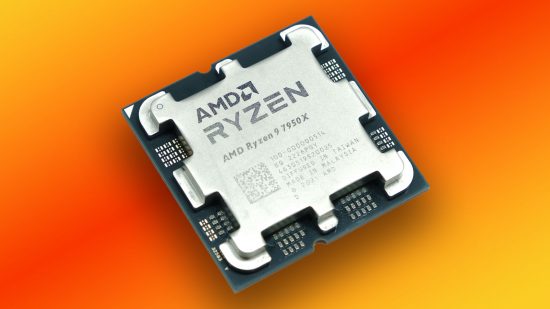Our Verdict
You get monstrous multi-threaded power from this power-efficient chip, which beats the Intel Core i9 13900K in terms of both performance and value. However, you don't need 16 cores for gaming, and you'll only benefit from this mighty CPU's power if you do lots of multi-threaded content creation work.
- Fantastic multi-threaded performance
- Great power efficiency
- Eco mode works great
- Gets hot in multi-threaded workloads
- Matched by Ryzen 7 7700X in games
- Still expensive
Unbelievably, the AMD Ryzen 9 7950X costs well over $100 less than it did at the time of launch a few months ago, dropping from $699 to a much more palatable price of around $579. This brings it in line with the Intel Core i9 13900K, so both CPUs are ready for the big flagship showdown.
This really is the battle for the best gaming CPU title, with these processors offering the very best that AMD and Intel can currently offer. While CPUs with a huge number of cores aren’t for everyone, and you very rarely need more than six for gaming, these multi-core monsters are ideal for video encoding, streaming, rendering, and all sorts of tasks that can take full advantage of lots of CPU cores.
Why you can trust our advice ✔ At PCGamesN, our experts spend hours testing hardware and reviewing games and VPNs. We share honest, unbiased opinions to help you buy the best. Find out how we test.
Ryzen 9 7950X specs
These are the AMD Ryzen 9 7950X specifications:
| Base frequency | 4.5GHz |
| Max boost frequency | 5.7GHz |
| Core | Zen 4 |
| Manufacturing process | 5nm |
| Number of cores | 16 |
| Number of threads | 32 |
| GPU | AMD Radeon Graphics |
| L3 cache | 64MB |
| L2 cache | 16MB |
| Memory controller | Dual-channel DDR5, up to 5,200MHz |
| Packaging | AMD Socket AM5 |
| Thermal design power (TDP) | 170W |
The AMD Ryzen 9 7950X still has the same 16 cores (and 32 threads via SMT) as the previous Ryzen 9 5950X, and it’s similarly based on two core complex dies (CCDs) with eight cores each. It also has a much higher TDP of 170W, compared to 105W for the Ryzen 9 5950X.
Overclocking the latter offered huge gains in multi-threaded performance, so it looks as though AMD has increased the power available to it in order to clock up the boost frequencies.
Indeed, the Ryzen 9 7950X has a massive 5.7GHz peak boost frequency, compared to 4.9GHz for the older CPU. Even if both CPUs processed the same number of instructions per clock (IPC) at stock speed, that boost would offer a sizable jump in performance, but AMD is also claiming a 13% uplift in IPC too.
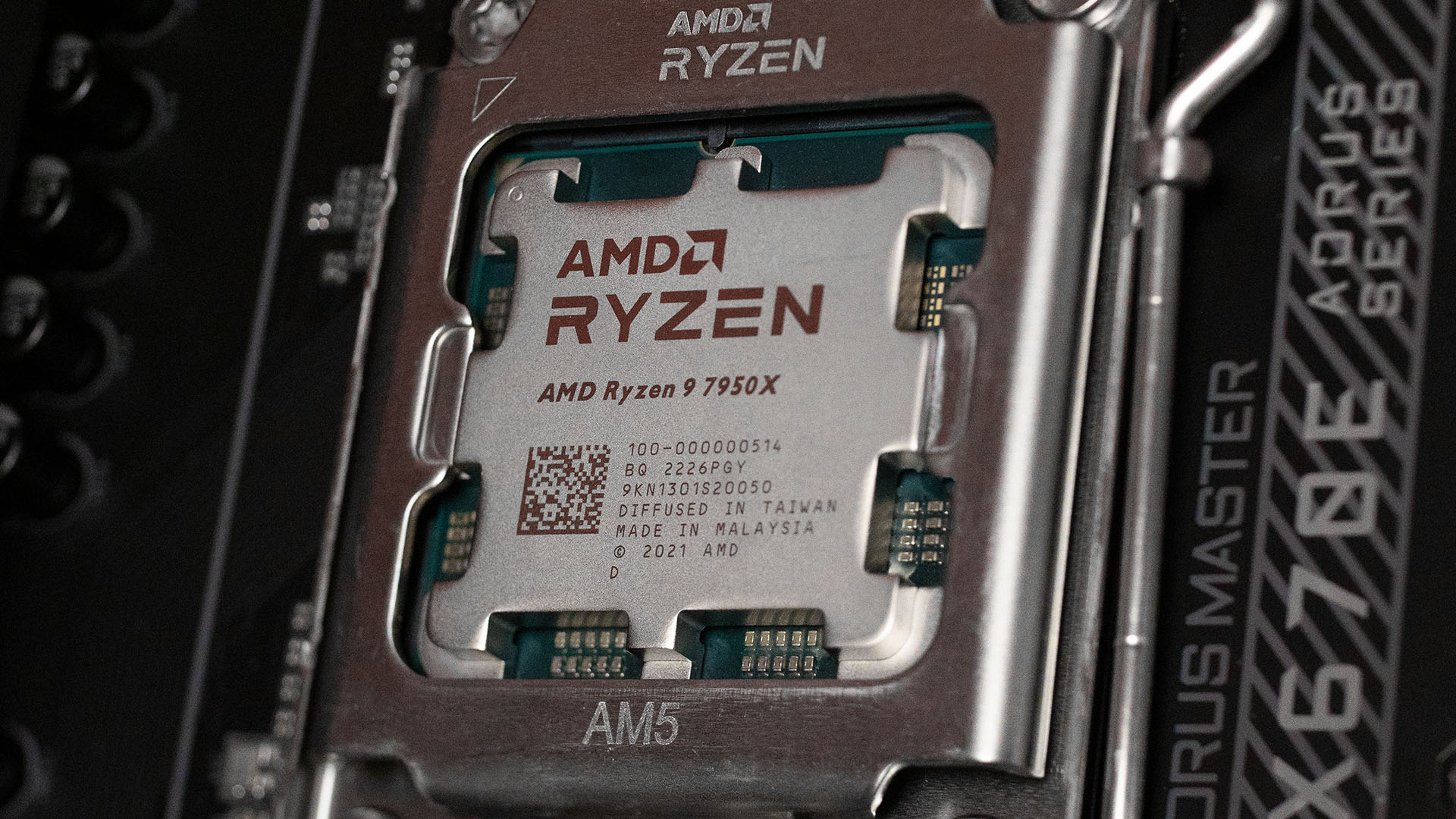
Under the hood is an L2 cache that has doubled in size to 16MB (1MB per core), which should cut latency, while boosting performance. You now get integrated Radeon RDNA2 graphics inside the chips too, although it’s only powerful enough to drive displays rather than games according to AMD.
Those quoted clock speeds aren’t just theoretical either. We saw peak all-core boost frequencies of up to 5.2GHz during testing, which is a huge increase over its predecessor’s all-core clock boosts, with the single-core boost often hitting 5.7GHz. What’s more, if you’re concerned about heat and power draw, AMD has introduced a feature called Eco Mode. This allows you to drop the thermal design power (TDP) from the standard 170W to either 105W or even 65W.
That’s just as well, as the Ryzen 9 7950X is a rather toasty CPU out of the box. Its core temperature regularly rose to 90°C in multi-threaded workloads, even with our custom water-cooling loop hooked up to it, which means a manual overclock is best avoided. However, this temperature fell dramatically when using Eco Mode, largely due to boosting frequencies being curtailed, falling to a 4.7-4.9GHz all-core boost at 105W and 3.6-3.8GHz at 65W.
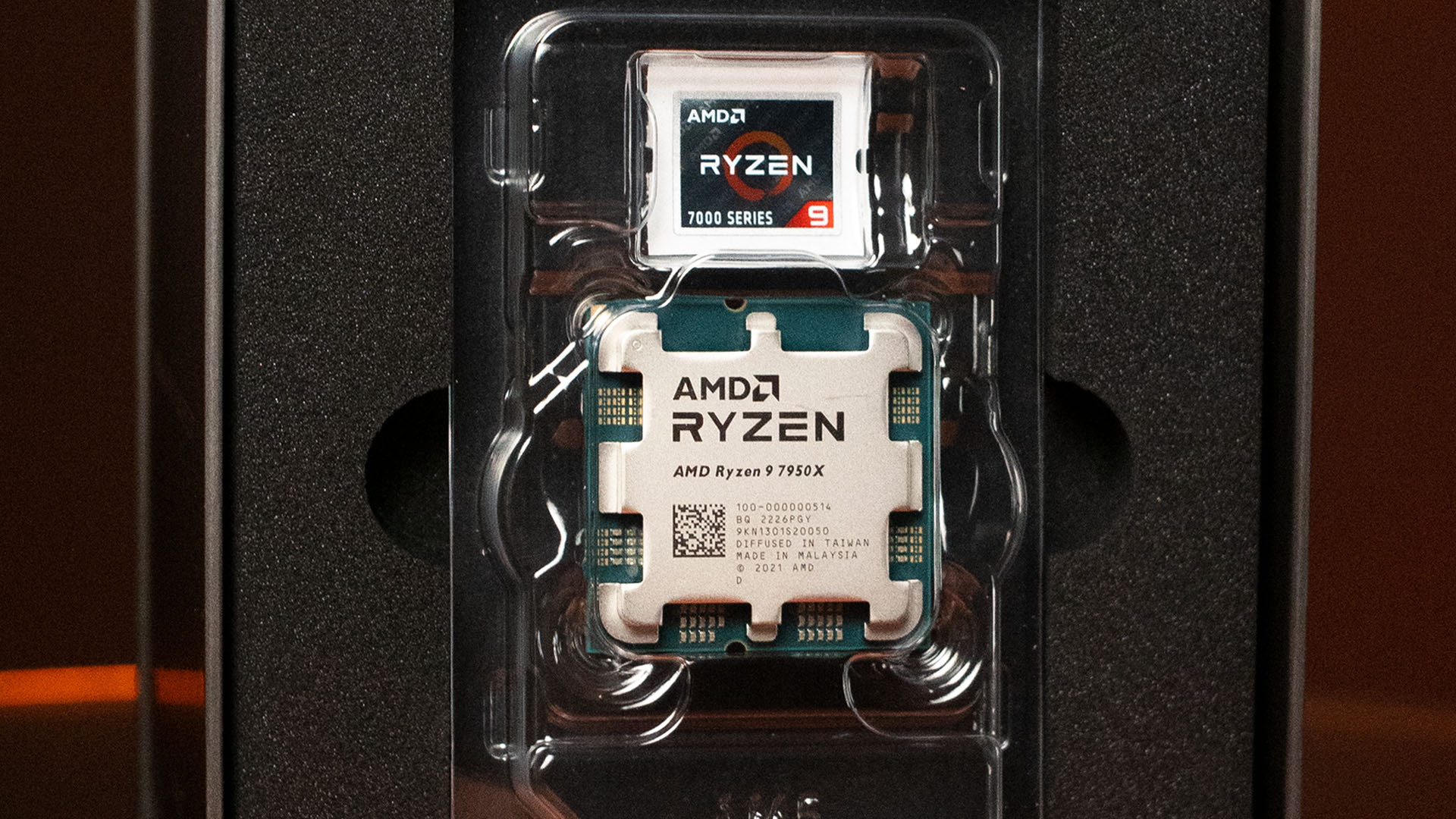
Ryzen 9 7950X benchmarks
Even when it was just running at 65W, the Ryzen 9 7950X’s Cinebench multi-threaded score of 29,821 was still faster than that of the Intel Core i9 12900KS and AMD Ryzen 9 5950X, and with dramatically lower temperatures too.
At the 105W profile, the 7950X scored 31,165, which is still far from matching the monstrous 38,422 achieved by the CPU at stock speed, but sadly the latter result is also beaten by the Core i9 13900K, which managed to top 40,000 points. There’s not much in it here, though – the 7950X is still very powerful, despite ostensibly having eight fewer cores than the 13900K.
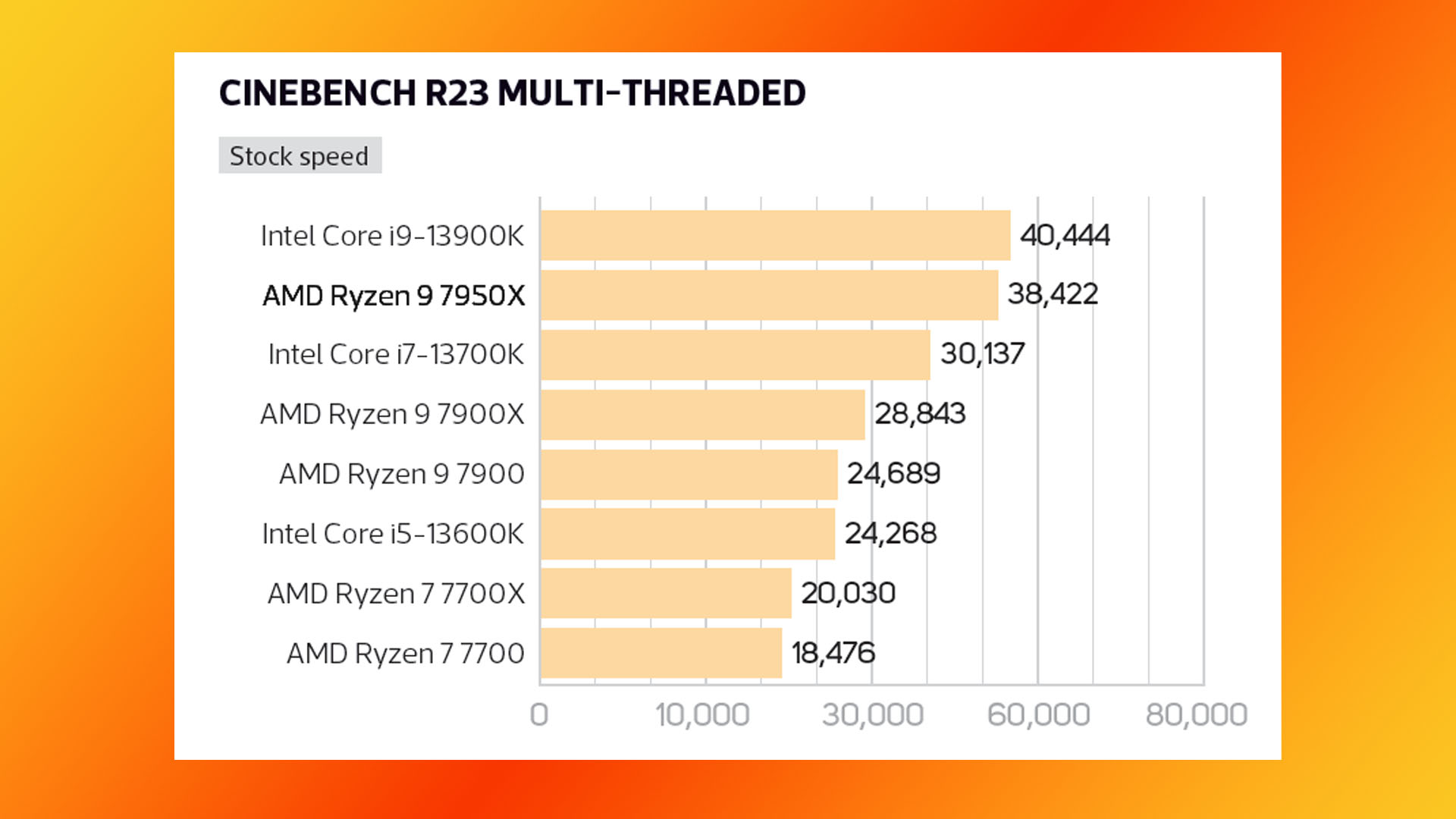
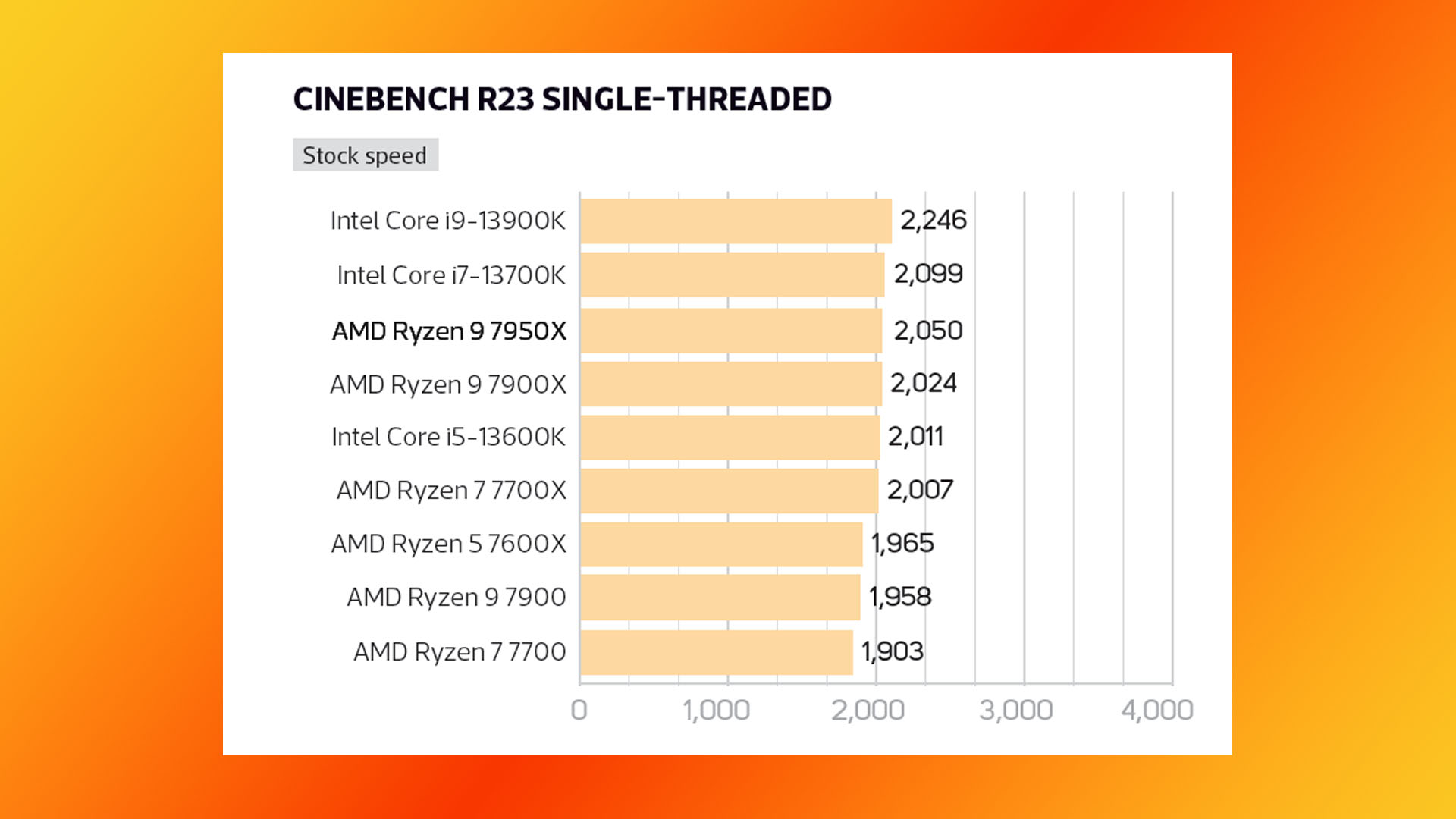
It was a close battle in our own RealBench tests too, with the AMD Ryzen 9 7950X emerging victorious with an overall system score of 495,461 compared to 486,267 for the Core i9 13900K. In particular, the single-threaded power of AMD’s Zen 4 architecture was demonstrated in our GIMP image editing benchmark, where four of AMD’s latest CPUs beat the Core i9 13900K.
The Intel chip had the edge in our heavily multi-threaded Handbrake video encoding benchmark, but the difference was minuscule. Again, there’s so little in it you could easily recommend either the 13900K or the 7950X for heavily multi-threaded workloads.
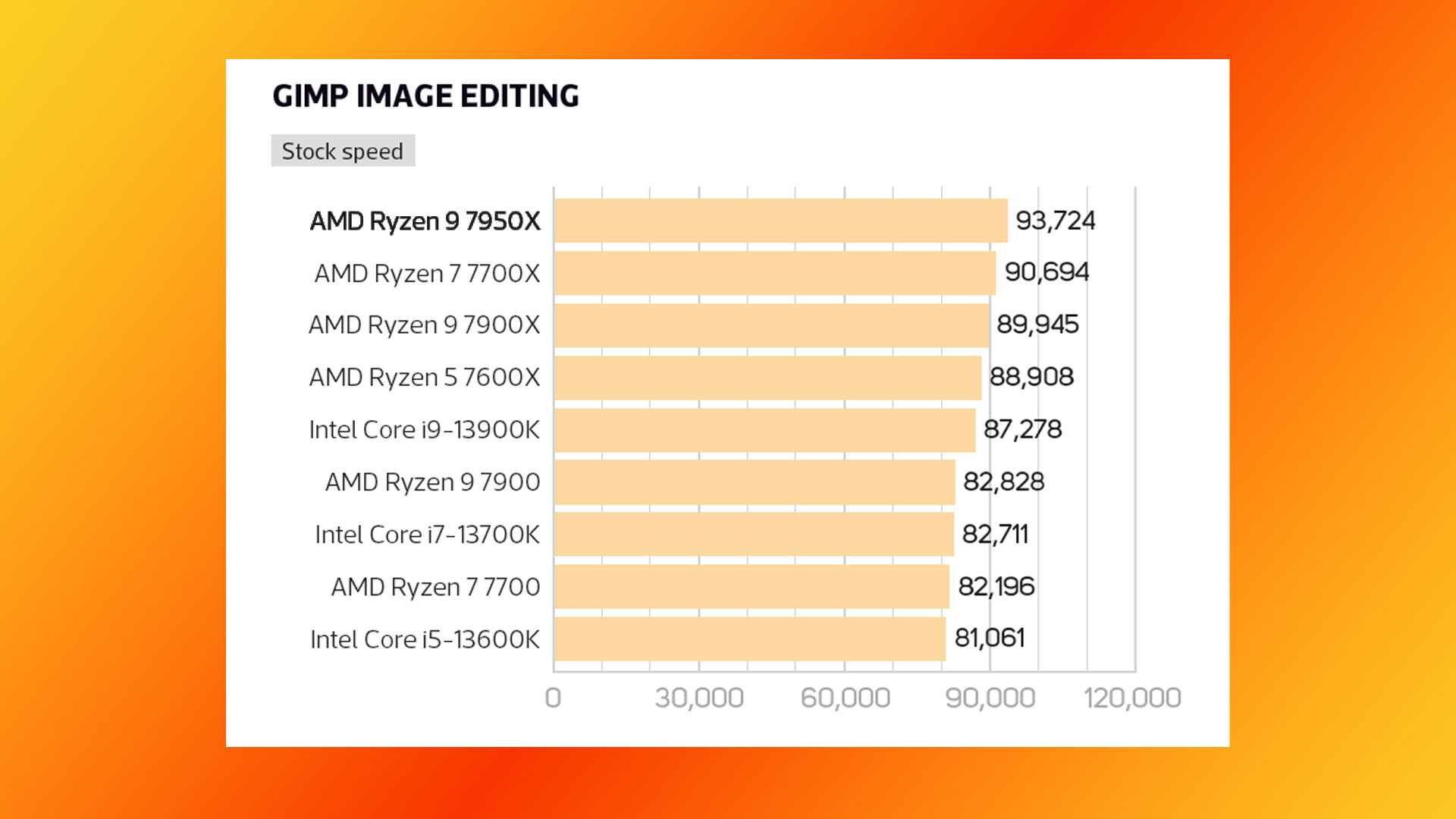
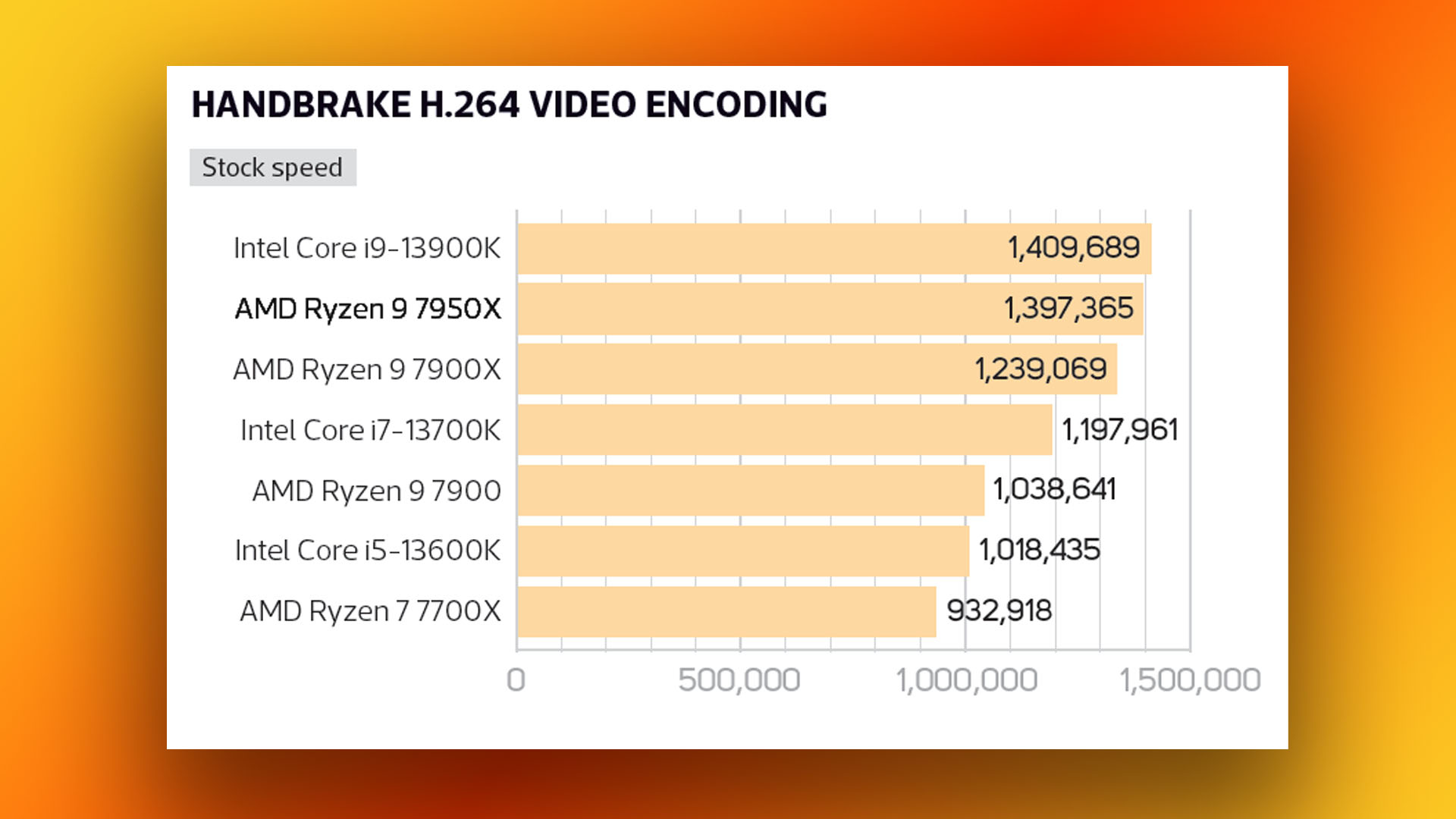
The Core i9-13900K also beat the Ryzen 9 7950X in our game tests too, however, and the top-end AMD CPU failed to offer much of a benefit over cheaper Ryzen 7000-series processors in games either. The Ryzen 9 7950X was also noticeably slower than the Ryzen 7 7700X in Watch Dogs: Legion.
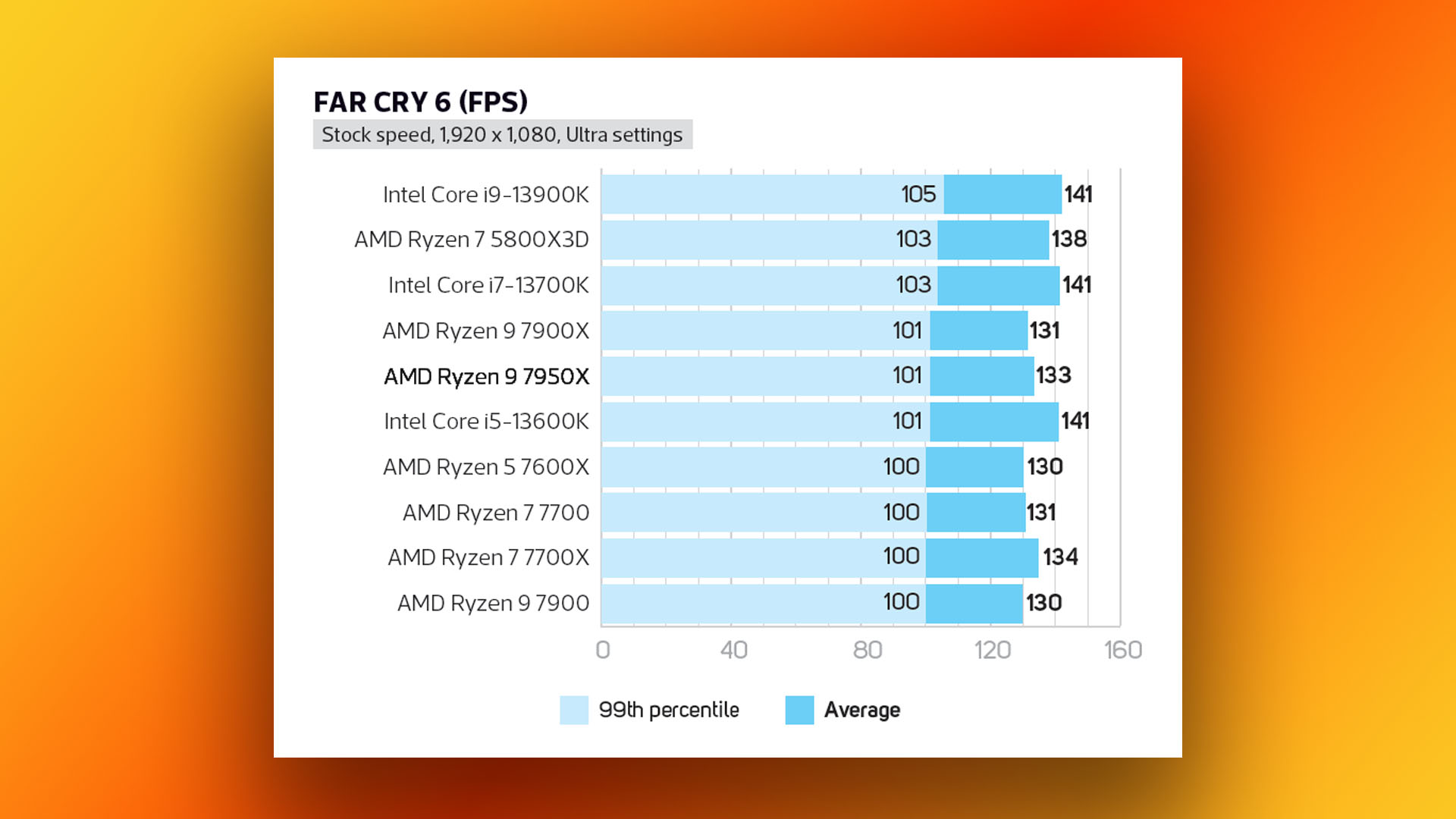
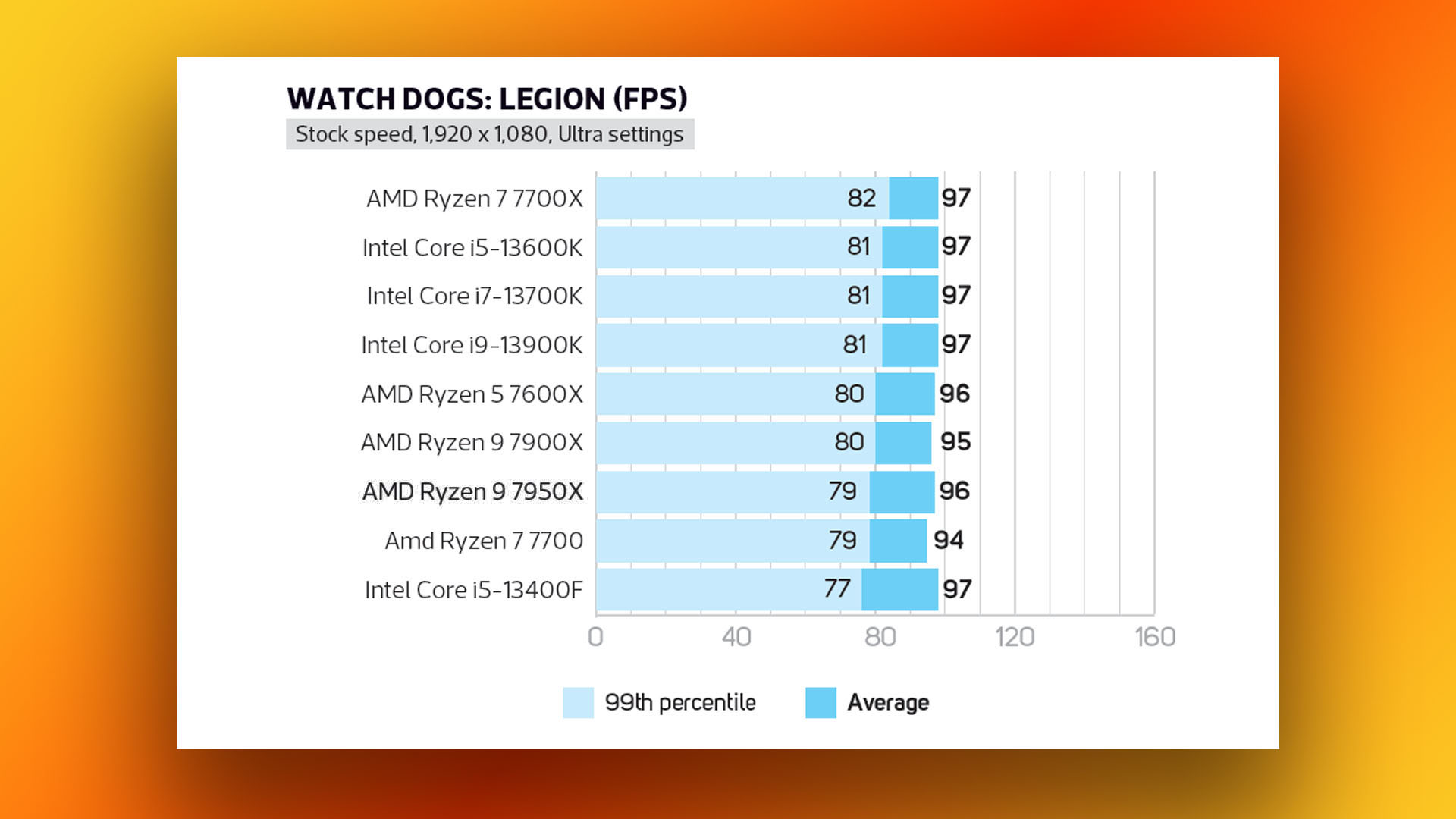
Ryzen 9 7950X power draw
Where the Ryzen 9 7950X really has the upper hand over the Core i9 13900K, however, is when it comes to power draw. Its peak draw of 376W for the whole test system was far lower than the 546W for the Intel CPU at load. In terms of performance per Watt, the Ryzen 9 7950X is the clear winner here, especially when the performance difference between the two CPUs is so small.
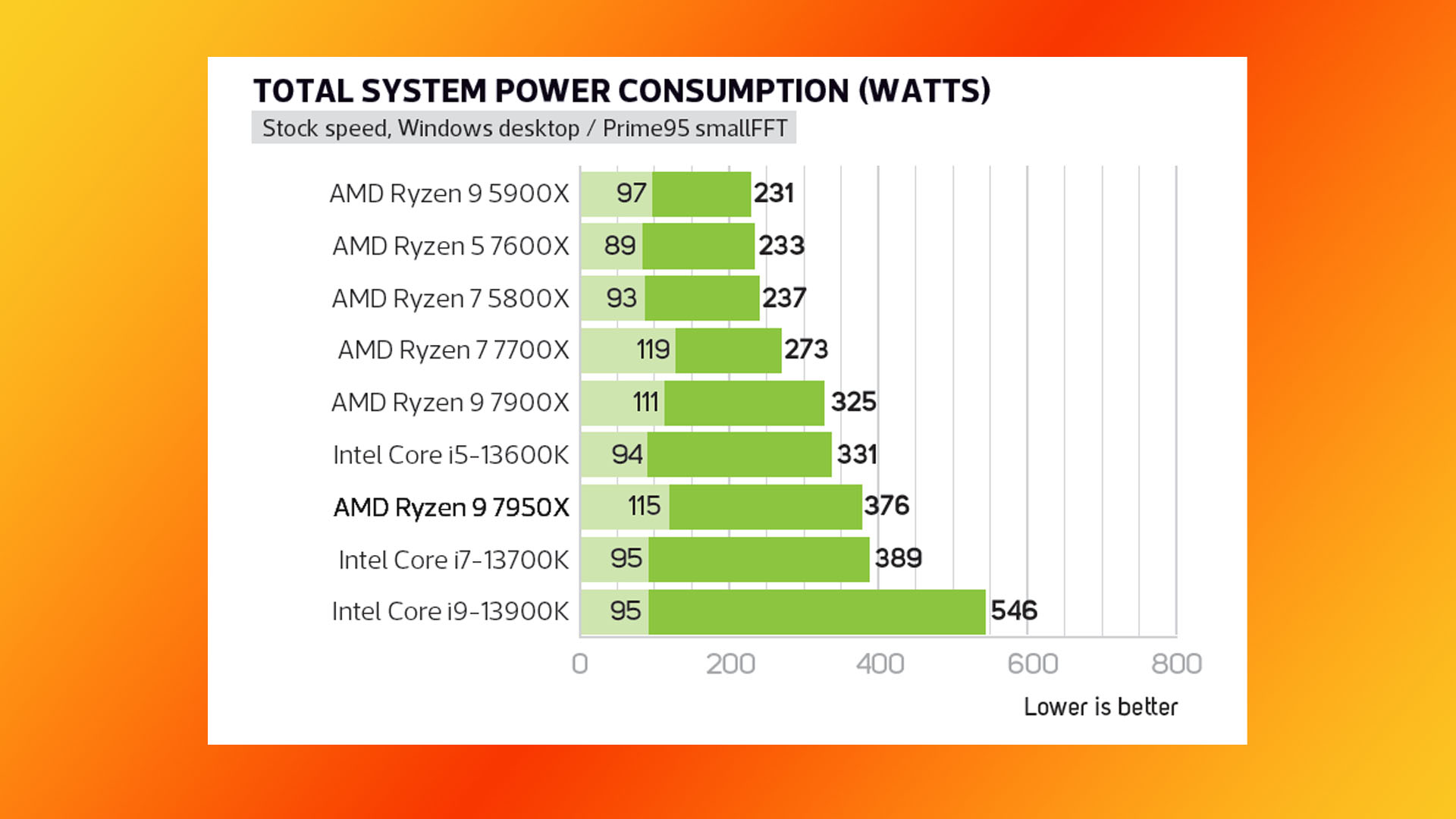
Ryzen 9 7950X price
Thanks to recent competition from Intel, the Ryzen 9 7950X price has dropped dramatically in the few weeks since it first launched. The AMD Ryzen 9 7950 price is $579, making it expensive, but the price isn’t unreasonable for the huge amount of multi-threaded power on offer.
However, bear in mind that there are other costs to factor into your budget if you choose this CPU. You’ll need a new Socket AM5 motherboard for a start, but you’ll also need DDR5 memory. This is an area where Intel has the upper hand, as its latest 13th gen CPUs can use older DDR4 memory as well as DDR5. This is unlikely to be a big factor for you if you’re considering spending this much money on a CPU, though.
Ryzen 9 7950X conclusion
There’s no doubt that the Ryzen 9 7950X now sits at a far more competitive price tag and offers some real competition to the Core i9 13900K. The two chips trade blows in content creation software, while the Intel CPU is slightly quicker in games. There’s honestly not much to choose between the two CPUs when it comes to performance.
Power consumption is significantly lower on the AMD chip, though, plus it has the advantage of low-power Eco modes that reduce power further and offer fantastic performance per watt.
Of course, this expensive 16-core beast is still a CPU most of us can only dream of owning. However, if you need a CPU for content creation first, with a smattering of casual gaming on the side, and you also prioritize power efficiency, the Ryzen 9 7950X is a stunning example of the Zen 4 architecture’s capabilities.
Alternatives
Intel Core i9 14900K
Now that Intel’s 14th gen CPU lineup is with us, the best competitor for all-out multi-threaded power is Intel’s latest Core i9 14900K. It has eight P-Cores and 16 E-Cores, giving you a massive total of 24 Raptor Lake cores, as with the Core i9 13900K. However, Intel has increased the clock speed right up to 6GHz.
This an awesomely powerful CPU, but bear in mind that you’ll need a decent PSU and CPU cooler to keep it in check. We recommend a 1,000W power supply if you’re also using a high-end CPU, and a 360mm AIO cooler. Read our full Intel Core i9 14900K review for more information.
AMD Ryzen 9 7950X3D
If you want to have your cake and eat it, AMD’s latest Ryzen 9 7950X3D also gives you 16 cores, just like the 7950X, but then adds a massive stack of L3 cache. Not only is it great for multi-threaded work, but it’s also a killer gaming CPU. That stack of 3D v-cache reduces the need for the CPU to page to system memory, reducing latency, and speeding up frame rates. It’s not cheap, though.
This post originally appeared on Custom PC, which has been reviewing PC hardware for over 20 years and is now part of PCGamesN. Join our 500k-member Facebook group to discuss this review.
